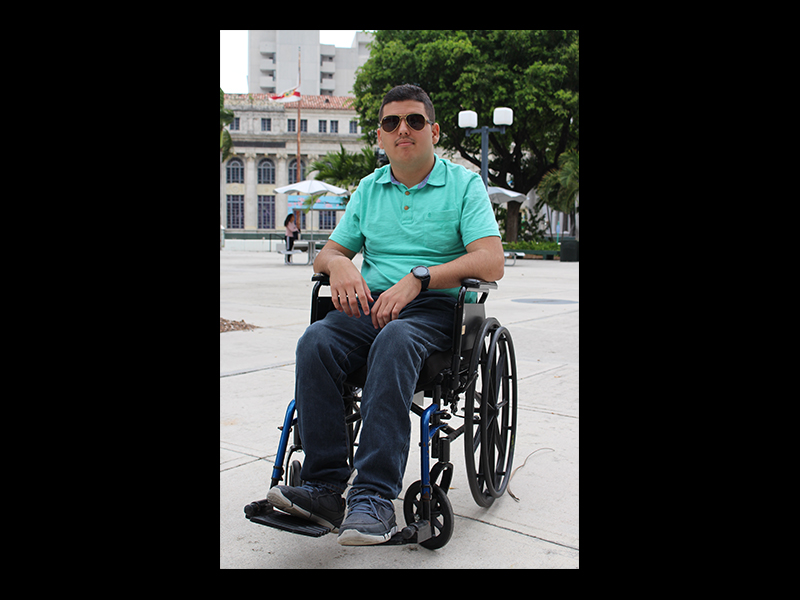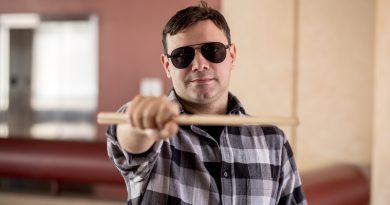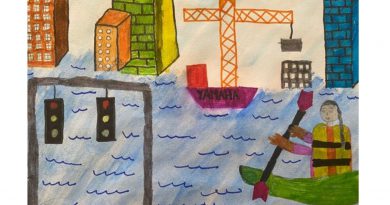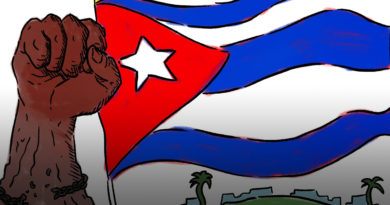Student With Cerebral Palsy Aspires To Be Next Albert Einstein
When Asnay Machado was eight months old, his parents noticed his legs were spasming and he couldn’t sit without assistance.
“He had to go through a lot of medical tests to find out what was going on,” said Machado’s father, Asnay Machado Alvarez. “Once we had the results, we tried to live a life as normal as possible, trying to engage him with school and his community as just one more kid.”
Machado, an 18-year-old studying physics at Wolfson and Hialeah Campus, was born with cerebral palsy—a disorder that affects his motor skills. He uses a wheelchair and has a hard time moving and maintaining his balance.
“He’s my hero,” Machado’s father said. “After seeing everything he goes through, you ask yourself: would I be able to live like this, like he’s doing? You get an idea about the challenges he has to face and you realize that he has fought through so much. He for sure doesn’t let it hold him back.”
Machado was born in 2000 in Camagüey, Cuba. He found it difficult to socialize and write when he started school at four.
“It took me until the beginning of third grade to learn cursive [in Cuba, cursive is taught at a younger age],” Machado said. “I spent the whole summer—June to August—practicing to get it right.”
At age six, he began receiving botox injection procedures in his knee flexors to reduce muscle stiffness. It allowed him to stand and walk better for three months, but the effect eventually vanished.
Soon, he was undergoing physical therapy three times a week. He used a machine to pull himself into a standing position before settling back into a seated one. Sessions lasted four to eight hours a day with the assistance of nurses and doctors at the Centro Nacional de Rehabilitación: Hospital Julio Díaz and Hospital Ortopédico: Frank País. That lasted for six years, though he continued a similar regimen at home for two more.
“I had a happy childhood though,” Machado said. “I never fully realized the extent to which my condition affected me until elementary school.”
Moving To Miami
He moved to Miami in November of 2014 because of the political turmoil in Cuba, and enrolled at Westland Hialeah Senior High School.
Doctors at Nicklaus Children’s Hospital diagnosed him with spastic cerebral palsy and performed surgery when he was 15 to help straigten his legs. The procedure allowed him to stand for longer periods of time.
Machado devotes nearly an hour and a half every day to exercise his arms and legs using a stander machine.
In 2017, he began pursuing an associate’s degree in physics at Miami Dade College.
“I took physics in tenth grade and fell in love with it,” Machado said. “You can describe the world not just through words, but through math. I want to understand reality—how the world works.”
As a freshman, Machado joined Year Up, a one-year program at the College that provides students with skills and training to use in their careers. He graduated from the program in July.
“Asnay did extremely well in the program,” said Lucia Angeles, site director of Year Up and Machado’s former coach. “He is one of our high-performing students, by which I mean he is extremely open to feedback, willing to make adjustments [and to] implement suggestions right away.”
Machado underwent six months of networking, public speaking and business etiquette training before interning at the School of Global Business, Trade and Transportation at Wolfson Campus as part of the program. For six months, he helped low-income residents prepare their tax forms at the College’s Volunteer Income Tax Assistance Program. Despite having difficulties multitasking, he also assisted at the front desk—answering the phone, greeting visitors and assisting in clerical work.
He is on track to receive his associate’s degree at the end of the Spring 2020 semester. Classmates describe him as intelligent, bold and humorous.
“I find it amazing how he is conscious of his disability but doesn’t let that hold him back,” said Siumey Chao, who studied with Asnay in high school and now at MDC. “He actually makes jokes about his wheelchair and never complains… just laughs it off and continues with his everyday.”
She’s confident he’ll win a Nobel Prize one day.
“Be ready for that,” Chao said.
The Future
After earning his bachelor’s degree, Machado hopes to attend graduate school at Princeton University—the alma mater of his favorite scientist, Albert Einstein—in pursuit of opportunities in the research field.
Despite his success, Machado continues to face challenges that come with living with a disability.
His biggest hurdle is transporting a $7,000 electric wheelchair that doesn’t fit in a normal passenger car. He is forced to use Miami-Dade County’s Special Transportation Service. All rides under the service must be requested a day in advance, waits can take up to thirty minutes and routes travel through backroads, extending travel time.
“Once you do get into the car, the routes are not made by a person who actually sits down and thinks about [whether], geographically, the routes make sense,” Machado said. “The problem is all the worse considering there’s no other service that does it, so there’s a lot of people using the service at any given time so it creates a mess.”
Machado usually wakes up at six in the morning for his 9 a.m. class. It takes him nearly an hour to get ready for school and often one to two hours for the transportation to arrive and take him to school. The transportation’s irregularity has caused him to arrive late to work or school on multiple occasions, according to Machado.
In December, he began a GoFundMe page to raise funds for an accomodation vehicle that could carry his wheelchair. Machado’s campaign has raised $2,018 but wheelchair accessible vehicles can cost up to $35,000.
“Complaining doesn’t solve anything,” Machado said. “You still have the problem plus you’re wasting the time that you have to solve it complaining. [If] you want to be great, you need to perform. So, get it together.”
To donate to Machado’s GoFundMe page, go to: www.gofundme.com/f/help-transport-asnay




